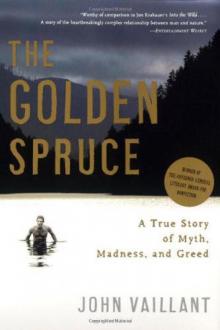- Home
- John Vaillant
The Jaguar's Children Page 17
The Jaguar's Children Read online
Page 17
“I asked the professor if I could keep the magazine and he said I could. He also told me it was the mushrooms that showed him, that allowed him to see beyond the faces and past the lines that made them, all the way to the tools and the hands that pushed them through the stone. ‘Once I saw this,’ he said, ‘I understood it wasn’t a question of design. It is the method that unites them.’
“It was then,” said Abuelo, “the professor told me some important news—to prove this idea for his book he needed to leave Latuxí and find a new site on the border with Veracruz. He asked me to go with him, and do you know the first thing I thought? That it will take me away from Zeferina. Everyone knew she was the professor’s mistress so it was not a good situation for me, but for some reason I was hopeful. She was in me somehow, and I hoped I was in her. The professor said this new excavation was a special chance for me—maybe I could come to Nueva York and work in the museum there. It was a big door opening, and that strange feeling I told you about from holding the Jaguar Man? I remembered this and wondered if it was a premonition—maybe I would travel across the mountains and meet the Jaguar Man again. So I said to the professor, ‘Yes, I want to go with you.’
“But secretly in my mind I was thinking, ‘Only if Zeferina refuses me.’”
“This is how it was when the professor left in the beginning of December to return to his family and the museum. When we were packing up the camp, Zeferina would look only at the ground because seeing faces made her cry. I don’t know what the professor told her, but I can only guess it was goodbye—forever—because of course her parents would not let her leave Latuxí alone. On her last day I was too busy packing artifacts in the professor’s tent and I never saw her leave. My heart was sick that day and I wondered would I ever see her again. My pueblo was a day’s walking from Latuxí and I didn’t even know her family name. I’m telling you, Héctor, in those days it could be hard to meet the chicas. I told myself maybe, if I’m lucky, I will see her in Tlacolula at a fiesta.
“The next day, we were loading everything onto the burros and walking out to the road where the professor had hired a truck for the long drive to D.F. I was in charge of the burros and I was praying—sí, mi joven, it takes la conchita to make this viejo pray!—I was praying I would see Zeferina somewhere in the village. But I did not. When I said goodbye to Professor Payne there were shadows around his eyes and he looked like his mind had left already, but he shook my hand and said again that he wanted me to work with him next year, and he would write to me in the spring.”
“In the new year of 1942, America was fighting in the war with Japan. For a campesino like me there were not many changes to the life. We were far from everything and we had no radio, but there was a bus driver I knew in Tlacolula who brought newspapers from el centro. I was thinking about Zeferina all these months—so much that my mother thought I was sick and my brothers who were all married a long time were making rude jokes to me in the milpa. Also, there was no letter coming from the professor, and this made things harder. Finally, I could not stand it anymore. After the first corn harvest in June, I waited for the moon to grow to half so I could see my way through the mountains, and then I walked again to Latuxí. All night I did this so I would have the greatest chance of seeing Zeferina in the day. Maybe she was married already, but I had to see her. I had to know. Ooni’ya, there were two big surprises waiting for me there.
“I arrived after sunrise and the first person I see to speak to is the padre who is on his way to the village office. He knew the professor and he had visited the excavation, but he was surprised to see me at this time in the year. When he understood that it was me, he said, ‘M’hijo, I have sad news.’
“Well, the first thing I think of is that something has happened to Zeferina. It shows you how out of my mind I was because there is no way the padre could know my feelings about this. Then he looked in my eyes and said, ‘I am so sorry to tell you—el profesor está muerto. May God rest his soul.’
“I could not breathe for a moment. I had been thinking only of Zeferina and I was so shocked I didn’t know what to do or say. The padre put his hand on my shoulder. ‘Forgive me for surprising you like this,’ he said. ‘It is a terrible loss. We learned only last week in a letter from the museum to the mayordomo. They wrote to say the funding for Latuxí is finished.’
“‘How did it happen?’
“‘They say only that it was a tragic accident. There are no details.’
“I was staring around like a blind man. I didn’t know what to do with myself. ‘Padre,’ I said, ‘is the church open?’
“‘Of course,’ he said. ‘Always.’
“So, I go into the church. It is dark and cool in there and I sit down on my heels against the back wall. I did not know until then how much hope for my life I had attached to Professor Payne, how in a moment it could be finished—just like that. So many doors closing at once. For some time I sit there feeling sick in my soul before I understand I am not the only person in that church. Up in the front, kneeling at the rail, is another, a woman. I was in a bad condition, but I would know that calabazo anywhere and I cannot believe it. I am so tired from walking all night and so sideways from the padre’s news that I wonder if I am seeing things. To be sure, I go up to the altar very quietly—I have no shoes—but she doesn’t move and she doesn’t disappear. I kneel down at the rail some distance from her and I see two things then—one, that she is crying into her hands, and two, that she is with the child.
“So, I ask you, m’hijo, how much can one man stand? First I was kicked by a horse and now I am run over by the wagon. I didn’t know what to say to her, but I couldn’t bear to leave her. I looked up at Jesus and He was hanging there like always, looking bad like He just lost a knife fight. He is no help so I lean on the rail, wrap my hand around my fist and rest my cheek there. I cannot believe how tired I am. ‘Zeferina,’ I say.
“Her shoulders start to shake and she is making little sounds. I want to go to her, but I do not. ‘Zeferina, it is me, Hilario Lázaro, from the excavation.’
“‘I know who it is,’ she says without looking. She doesn’t sound happy to see me.
“‘I’ve been thinking about you all this time,’ I say. ‘I miss you.’
“‘You will be over that when you see me.’
“‘I can see you,’ I said. ‘And still I miss you.’
“‘I want to die.’
“Now she is really crying. ‘No,’ I said. ‘You can’t do that. There is too much of that already.’ It is all I can do not to start crying myself. And then, before I know what I am saying, I said, ‘I will help you.’
“She looked at me for the first time then and she did not look like herself. Her eyes were red, her cheek was purple and her lip was split open. I understood then she was not married and that this must be the professor’s child she carried. I was angry to see her hurt like this and I slapped the altar rail. ‘Who did this?’ I said. She covered her face again and was just crying. I was thinking to myself who could do such a terrible thing to such a beautiful face. ‘Your father,’ I said.
“‘He says I can go to Hell and he will hold the door.’
“‘Your mother?’
“‘She is only crying and crying.’
“‘Well, there’s no Hell where I live.’
“‘Of course there’s a Hell,’ she said. ‘I’m in it right now.’
“‘Not where I live, and it’s only a day’s walk from here. Maybe you’d like to visit? Right now we have a baby burro. He is a very sweet burrito and everyone knows there are no burritos in Hell.’
“‘You’re teasing me.’
“‘No. This burrito is the sweetest one you ever saw. Wait until you see his little nose. Maybe your baby would like to play with him.’
“‘My life is ruined and you’re making jokes. What’s wrong with you? Go away!’
“‘Nothing’s wrong with me, but your man on the cross here is having a very hard time. There’s noth
ing I can do for Him, but I can help you, Zeferina. I want to be near you for the rest of my life.’
“‘I am a sinner.’
“‘Who cares?’
“‘Who cares? Jesus does!’”
Abuelo stopped then and said, “I have to tell you, Héctor, I couldn’t believe I was having this conversation, but at least she was talking to me. So I point to el Señor who is bleeding from every hole and I say, ‘Look at Him, will you? Look at the problems He’s having—and so many. Do you really think He’s worrying about you?’
“‘He is bleeding for my sins.’
“‘No, chica, you are. And one crucifixion is enough.’
“‘Es una blasfemia.’
“‘Hermana, la blasfemia is thinking you are the center of His attention. Look at this world we’re in—los Nazis, el Comunismo. Fighting and bombs. What are we in all of this? Nada. Insectos. He has no time for us. That poor cabrón can’t even help Himself.’”
“She was looking at me like I had horns but I would not be stopped. ‘And look at her.’ I pointed to María who was off to one side in her glass box. ‘Is she married to the father of her child?’ Zeferina jumped like she was being burned but stayed where she was, forehead pressed into her knuckles. ‘Does it matter?’ Now I am almost shouting. ‘No! She loves her baby, doesn’t she? The baby is fat and beautiful, yes? And white! Now that is the real miracle.’
“Zeferina began to cry again. ‘You are beautiful too,’ I said to her. ‘Como un milagro.’
“Ooni’ya, I never said such words to anyone before. But many things were coming clear to me—most of all that I’m in love with Zeferina and not just the idea of her. ‘Come home with me,’ I say. ‘Right now, today. I have a place for you and I will take care of you and be a father to your baby. I promise. If you want we can be married also.’
“She did not say yes to this, but she did not say no either so I left the church to find her father. It was hard to leave her because I was afraid she would disappear and I was not strong enough to lose another that day. When I asked some people outside for the home of Zeferina, they would not answer because Latuxí was far from the main road and the people there were suspicious of anyone they didn’t know. Finally, I found a boy who would tell me and I went alone to Zeferina’s house to speak with her father. The house was small and by itself, and in front was grass cut down close to the ground by a burro which was tied with a long rope to a dead guayaba tree. On the edge of the yard were calla lilies growing for the market, covered over with weeds. There were chickens running, but besides the burro, no other animals. The house had only one window and this was covered by a goatskin with the hair scraped off and nailed in with wooden pegs. The door was made of cane stems with adobe to fill the cracks, and the hinges were of leather. It was a poor man’s house, even for that time.
“I stood outside in the grass and announced myself, and a man who must be Zeferina’s father came to the door. He was drunk with no shirt and his eyes were red and hot. I told this man who I was, that I understood he had difficulties with his daughter and that I could make a home for her in my village. ‘Take her,’ he said, waving his hand down the road. ‘Take her to Hell if you like. She has no home here.’
“At that moment, a woman ran out of the house and threw herself down in front of me. If she was drunk I could not tell because the man had beaten her too, and her face was covered in dirt and tears and something that looked like cornmeal. She was on her knees in the short grass, pulling at my pants leg and crying, begging me not to take her daughter from her. But the man had no patience for this and he pulled her to her feet by the hair, hit her again and drove her back inside, shouting, ‘I swear to God, if I see that coño in my yard I will kill her with these hands!’
“Then he looked at me, holding his two fists. He was breathing hard and I could see in his eyes that, drunk or not, he was a dangerous man. I did not want to fight him so I took my hat off and held it in front of me. I don’t think he was expecting this and he reached out his hands to me with the palms showing and said, ‘To her family, to this village, to the Virgin—that girl has brought only shame and misfortune. After two harvests we still have no corn to sell and barely enough for seed. Why? A month ago our calf died. Why? Now the gringo is dead and there is no more money for our family. Why are these things happening to us?’
“The man looked at me as if I might know the answer. ‘With your permission,’ I said, ‘I will take your daughter, and maybe things will be better.’
“And so I did this—took Zeferina home with me through the mountains. For a month she cried, but her belly grew, and at night while she slept I could feel the baby in there kicking. I tried to imagine what it would look like, but all I could see was the professor’s big mustache. I’m telling you this was no simple thing for me and I wondered, with her sadness and a child that was not mine, if I had made a bad mistake. I tried to make her comfortable and my mother tried to feed her, but her heart was broken and everything she wanted was far away and impossible to have. To make things worse, she would not let me touch her except her back because it was hurting from the baby. Ooni’ya, I have always been good with animals so that is what I did—with my hands I calmed the muscles there, and in this way she came to know me. In time, I came to know her—very well, but it was the baby who first lifted her from sadness.”
There is more, but now you know a little bit about how my abuelo came to be with my abuela, and about her baby who is my father. Sí, AnniMac, this Professor Payne is blood to me, and whatever was in him—good and bad—is somewhere in me also.
One day, after Abuelo told me all this, I was alone with my father and I asked him about the professor and why didn’t he try to find his family.
“Look at me,” he said. “You think they would accept me?”
“You could explain—”
“What, that I’m their bastard half brother from Mexico?”
“If you told them about Abuela—”
“And what was she? A gringo’s milk cow. Nothing more.”
“You don’t know that,” I said.
“And you know less.”
“Abuelo showed me his picture,” I said. “You look like him.”
“And see the good it does me.” He hawked up and spat. “I cannot speak his language, I cannot read it, and I am not welcome in his country. Biche,” he said, like it was a curse, “green eyes is all I got from him.”
After this I looked at my father in a different way. To have a gringo father with so much—money, respect, education—and to be cut off from all of it, for Papá this was almost worse than having no father at all. His mother loved him of course, and Abuelo was a good man most of the time, but in our pueblo to be half gringo and a bastard also es una maldición. Our deportation, the ice storm with the dead coyote, not being able to make his letters—all these things and more were connected in my father’s mind. Each one, another punishment for being born.
21
Sat Apr 7—07:31
In here, we are not dying, we are evaporating. The weakness—from no water and bad air—it creeps in like a fog, pulling the life out of us with every breath. I know this because when I move away from the pipe, I can feel it—a drifting out of myself. I am used to the heat because up in the Sierra, the sun is closer than God, but in here it reminds me of a game we played after school when I lived in the pueblo. Chuy, the witch’s son, taught it to us. He called it Ojo de Dios, God’s Eye, and you play it with the sun and a piece of glass. It is like a test—how much pain, and the smell is terrible. I still have the marks. I haven’t thought of it in a long time but I am thinking of it now. This and the water.
Dying of thirst, there is a madness that takes over a person. I heard it, but I tried not to see it. You will take off your clothes no matter who is there and you will suck on anything to make the saliva come—coins, scapulars, your wedding ring, maybe some stone. It is like being a baby again—you turn into one big mouth. The rest of you is only there
to carry it around, and the more thirsty you are the bigger your mouth grows, the rest of you getting smaller and smaller and farther away until you disappear and only the thirst is left.
Any of those who still have the voice to speak simply beg for water—Please, God. Señor, por favor, just one drink. And every time is like the stabbing from that nun in the basilica because I am the devil in the corner who will not give it. In here, our prayers go nowhere. God cannot hear us. Or will not. But I am still praying—for someone to find us, for the bars to come back, because you are César’s friend with the American code. And because I have nothing else. Is this why my mother does it? Is this what brings her to her knees? Tell me, AnniMac, do you understand the connection between believing and desperation? Would you ever do such a thing like this? Who do you believe in? What do you believe?
My Abuela Zeferina was such a strong believer she would set herself on fire to show her devotion to the Virgin, and she is not the only one. Five years ago was the last time we made the pilgrimage to the pueblo of Juquila, high in the southern mountains where the Virgin appeared to a campesina washing the clothes. Abuela made a new gown for her and she wanted to offer it in person, but the waiting list to dress Juquila is long. In her church there is a room stacked to the ceiling with tiny gowns. Not hundreds, AnniMac—thousands. Juquila has clothes to wear until Judgment Day.
In the plaza by Juquila’s church are tables with mounds of clay and from this the pilgrims make their own milagros—a leg that must be healed, an airplane for a safe journey, a sick relative in bed. For these blessings they bring offerings of money and food and dresses, and some, like my abuela, dance in the dark street with rockets shooting out of their heads. They say the Chinese invented fireworks, but it is Oaxaqueños who dance with them and become that fire. For the saints we build castles of fireworks as tall as a church, and for Juquila some women will carry smaller ones on their heads. The coheteros build them from wet cane that you can bend into any form—a church, a bull, a ghost, a virgin. To this you attach the spinning wheels made also from the cane, and then the rockets. Some shoot high into the air and explode in all the colors, and others are flaming jets. It is the jets that turn the wheels and set the castillo in motion.

 The Golden Spruce: A True Story of Myth, Madness, and Greed
The Golden Spruce: A True Story of Myth, Madness, and Greed The Jaguar's Children
The Jaguar's Children The Tiger: A True Story of Vengeance and Survival
The Tiger: A True Story of Vengeance and Survival The Golden Spruce
The Golden Spruce